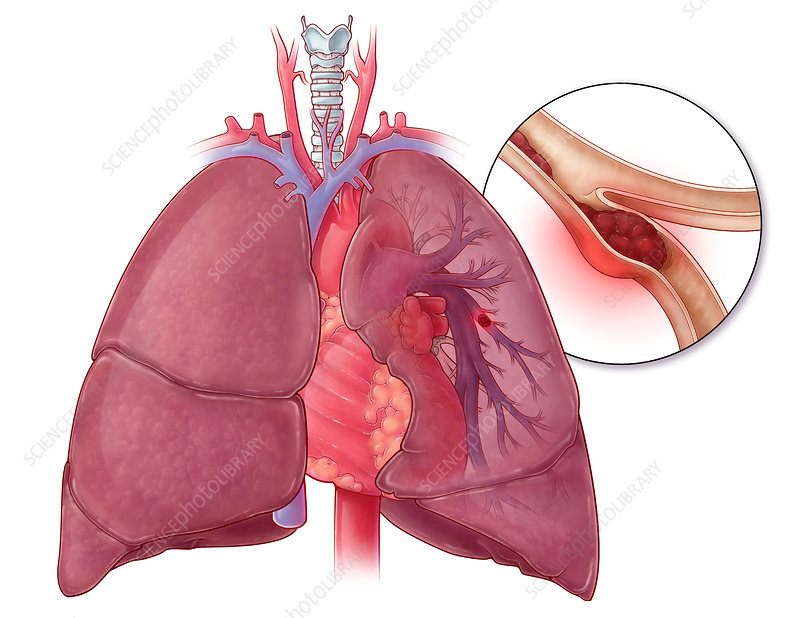Which patient is most likely experiencing a pulmonary embolism (PE)?
A 40-year-old woman who came into the ER with a swollen, painful calf and now complains of chest pains and having trouble breathing, with tachycardia and tachypnea.
A 60-year-old man who is tired and has been in the med-surg unit for 3 days with AKI after taking IV antibiotics.
A 30-year-old man with a history of smoking and a sedentary lifestyle who had an appendectomy 1 day ago and is refusing to ambulate or wear compression stockings.
A 55-year-old woman who came into the ER with chest pains, shortness of breath, nausea, tachypnea, and radiating jaw pain.
The Correct Answer is A
Choice A reason : The symptoms described for the 40-year-old woman align closely with the clinical presentation of a pulmonary embolism. Swelling and pain in the calf may indicate deep vein thrombosis (DVT), which can lead to PE. The presence of chest pain, difficulty breathing, rapid heart rate (tachycardia), and rapid breathing (tachypnea) are hallmark signs of PE³⁴.
Choice B reason : While the 60-year-old man is experiencing fatigue, which can be a symptom of many conditions, there is no direct indication of PE. Acute kidney injury (AKI) after IV antibiotics suggests a different pathophysiology unrelated to PE.
Choice C reason : The 30-year-old man's refusal to ambulate or wear compression stockings after surgery increases his risk for DVT and subsequently PE; however, he does not currently exhibit symptoms that are as indicative of PE as the 40-year-old woman.
Choice D reason : The 55-year-old woman's symptoms could suggest a cardiac event, such as a heart attack, especially with the radiating jaw pain. While PE can present with similar symptoms, the radiating pain is more characteristic of cardiac issues³.

Nursing Test Bank
Naxlex Comprehensive Predictor Exams
Related Questions
Correct Answer is D
Explanation
Choice A reason : Tarry stools, also known as melena, can be a sign of gastrointestinal bleeding, which may occur in cirrhosis due to the development of esophageal varices. However, it is not a direct symptom of cirrhosis itself but rather a complication that can arise from the condition¹.
Choice B reason : Blood in the urine is not a typical finding associated with cirrhosis. While cirrhosis can lead to problems with kidney function, hematuria is not a direct symptom of liver disease and may indicate other urological conditions¹.
Choice C reason : Moist skin is not commonly associated with cirrhosis. Patients with cirrhosis often experience skin changes, but these typically include jaundice, bruising, and spider angiomas, not increased moisture of the skin¹.
Choice D reason : Spider angiomas are a common finding in cirrhosis. They are small, spider-like capillaries visible under the skin and are caused by the increased estrogen levels that occur due to the liver's inability to metabolize hormones properly. They are most often found on the face, neck, upper chest, and arms¹².
Correct Answer is B
Explanation
Choice A reason :While consulting with the healthcare provider is important, immediate action is necessary to prevent harm. Waiting for a prescription may delay intervention.
Choice B reason : When a patient frequently attempts to remove their intravenous (IV) catheter, it's essential to address the behavior promptly to prevent potential complications such as catheter dislodgement, infection, or injury. The most appropriate initial response is to cover the catheter to reduce the patient's awareness and access, thereby decreasing the likelihood of tampering.
Choice C reason : Providing more stimulation could be counterproductive if the client is already agitated or confused. The nurse should assess the client's needs and environment to determine the appropriate level of stimulation.
Choice D reason : Waiting without taking action is not advisable as the client may harm themselves by removing the IV catheter. Immediate intervention is required to ensure the client's safety.
Whether you are a student looking to ace your exams or a practicing nurse seeking to enhance your expertise , our nursing education contents will empower you with the confidence and competence to make a difference in the lives of patients and become a respected leader in the healthcare field.
Visit Naxlex, invest in your future and unlock endless possibilities with our unparalleled nursing education contents today
Report Wrong Answer on the Current Question
Do you disagree with the answer? If yes, what is your expected answer? Explain.
Kindly be descriptive with the issue you are facing.
